Photoshoot
INTERVIEW
Dakota Johnson is a lot like that proverbial duck. She appears serene, but just beneath the surface she is paddling furiously—all day and all night. “I feel the most insane anxiety about our world and our planet,” she says in between bites of takeout salad. It’s 2 p.m. on a Wednesday in late February, and we’re sitting in the quaint two-bedroom bungalow just south of Hollywood that she uses as an office for TeaTime Pictures, the film and TV development company she and former Netflix exec Ro Donnelly launched last fall.
The whole vibe of the place is effortless Hollywood. A sunny front room is bare except for two framed posters from Johnson’s Luca Guadagnino films, the 2016 drama A Bigger Splash and the 2018 thriller Suspiria. In the bathroom hangs a surreal shot of Johnson’s mom, the actress Melanie Griffith, and her ex Antonio Banderas gliding through a throng of photographers with a police escort. We had been talking about whether or not to get froyo, but we’ve moved on to—what else?—the global COVID-19 virus scare. “I’m constantly thinking about the state of the world right now. It keeps me up at night, all night, every night,” she says. “My brain goes to crazy dark places with it.” She takes another bite of spinach and chews slowly.
Young women delivering statements of grave concern without any overt alarm has become something of a trope. A laissez-faire delivery is practically the calling card of “chill girls” everywhere. But 30-year-old Johnson isn’t chill—not that unbothered version of the word anyway. “My brain moves at a million miles per minute,” she says. “I have to do a lot of work to purge thoughts and emotions, and I am in a lot of therapy.”
From an eventful upbringing that featured two famous parents (Dad is Miami Vice star Don Johnson), divorce, and a childhood split among Colorado, Los Angeles, and countless film sets, she emerged the consummate observer. “I’ve struggled with depression since I was young—since I was 15 or 14. That was when, with the help of professionals, I was like, Oh, this is a thing I can fall into. But I’ve learned to find it beautiful because I feel the world,” she says. “I guess I have a lot of complexities, but they don’t pour out of me. I don’t make it anyone else’s problem.”
That tension is precisely what makes Johnson so compelling on-screen. Her characters radiate with warmth and empathy but rarely boil over. They’re watchers (A Bigger Splash) and worriers (How to Be Single) and submissives (the Fifty Shades franchise) who wrestle with their wild sides. Her upcoming role in The High Note—an in-on-the-joke music-industry comedy about a fortysomething pop star (Tracee Ellis Ross) and her starry-eyed assistant, Maggie (Johnson)—is no exception. “Dakota is passionate and feels things deeply, but she’s also wonderfully charming and playful,” says costar Ross. “She knows where she is and who she is and isn’t afraid to speak up.”
As happens in so many films about ambitious young women, Maggie often gets schooled by her superiors. But unlike so many films about ambitious young women, in this one she never suffers a crisis of confidence. “Maggie is so emotional and so open, but I didn’t want her to get totally blown over by the wind,” Johnson says. “I think, especially for women, it’s such a hustle all the time. It’s a fight every day. Maggie’s vulnerable, but it never stops her from going for the thing that is the most important to her.” For the film’s 28-year-old screenwriter, Flora Greeson, who used some of her own experience as a Hollywood aide to in-form the character, that was a radical script flip. “My version was this little trashy girl running around trying to keep her shit together,” she says. “Dakota was like, ‘I don’t want this character apologizing in every scene. That’s not what Maggie does.’”
It’s not what Johnson does either. A recent appearance on The Ellen DeGeneres Show went viral after she refused to play along with the comedian’s assertion that she wasn’t invited to Johnson’s 30th birthday party. “That’s not true, Ellen. You were invited,” she says firmly, “but you didn’t come.” And part of the reason she started TeaTime was to avoid getting sidelined onset. “For a long time, I’d do a movie and have no say,” she says. “I could go into something, and it’ll be one thing, and then it comes out as a totally different thing. As an artist, you’re like, ‘What the fuck?’” (Johnson has denied reports that she was displeased with the Fifty Shades films.) Still, she wanted to say that less and to be a part of high-level decisions like casting and writers and the overall aesthetic of a project. “I definitely want to have my craft, my artistry, and my ideas respected and tossed around. I want to be part of the process,” she says. “I also have really specific taste.”
If the video she just codirected for the Coldplay single “Cry, Cry, Cry” is any indication, taste has as much to do with emotion as it does environment. “I wrote the story and pitched it to the band like every other director did, and they chose mine—not because they’re partial to me at all,” she says with a laugh. (Johnson has been dating Coldplay frontman Chris Martin since 2017.) She lovingly curated “every single detail,” from the amount of confetti that fell on the dance floor to the look in the dancers’ eyes to the laces in their shoes. “When I work, I’m constantly thinking about the job. It takes up so much of my brain,” she says. “Not all of my projects are only good messages, but all of them have a little bit of something that makes me feel like it’s an okay thing to pour my heart into.”
Her heart, it seems, calls the shots. “I really don’t have a method, and I don’t want one,” she says of picking projects. “It’s very intuitive and emotional.” A few years ago, she was in Italy and “in a place that felt very dark” when she was drawn to a short that would eventually become The Peanut Butter Falcon. The drama, which found a huge afterlife on VOD, is about a young man with Down syndrome (Zack Gottsagen) who finds an unlikely companion in a scruffy outlaw (Shia LaBeouf). There’s a spark between Johnson’s and LaBeouf’s characters—“I think Shia might be the greatest actor of my generation, which I wouldn’t say to his face,” she jokes—but Johnson fell hard for another man during filming: “Zack Gottsagen has become one of the greatest loves of my life,” she says. “He totally shifted my world.”
It’s one of her favorite things about movies, the way making—and even watching—them can serve as an escape hatch to a different place. She was recently rewatching Notting Hill when she felt a pang for something familiar: a happy ending. “There are not movies made like that anymore. Movies where they take their time and the pacing is more languid and it’s about light-hearted escapism and wishful thinking,” she says. “When I was growing up, I loved those movies so much. They were the reason why I was like, Well, maybe I could be an actress. Maybe I could be a movie star.” The irony that she was practically born to be a movie star hangs in the air, but she doesn’t clear it. Like Maggie, she doesn’t self-deprecate. “There’s something really nice about making something that makes people just feel good and get out of their lives for a second and maybe think, Oh, my dreams could be not dreams, they could be ...”
VIDEO
BEHIND THE SCENES
VIDEOS
Source | Source | Source | Source | Source | Scans
New BTS Video of Dakota for Marie Claire ❤ #DakotaJohnson; shared by marieclairemag on Instagram. pic.twitter.com/n9BLAu1aei— Dakota Johnson Fans (@LifeDJohnson) May 12, 2020
New BTS Video of Dakota for Marie Claire 💜 #DakotaJohnson; shared by marieclairemag on Instagram. pic.twitter.com/sIbktrBTzX— Dakota Johnson Fans (@LifeDJohnson) May 12, 2020


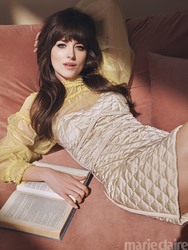
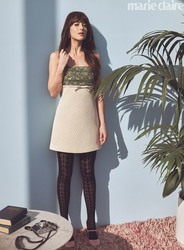
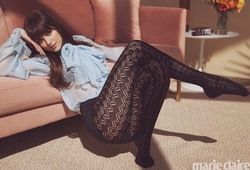
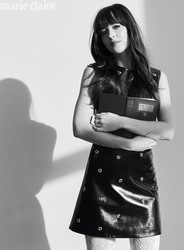

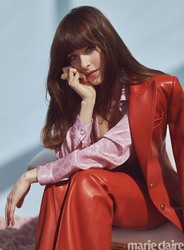

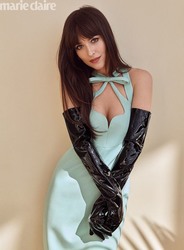

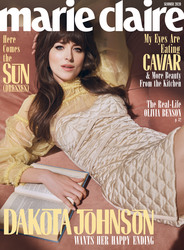
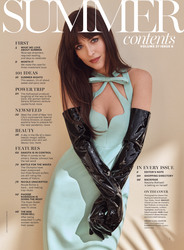
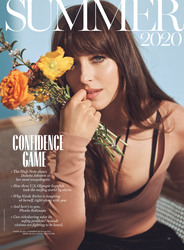
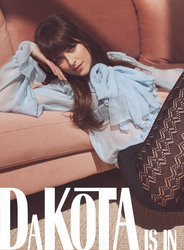
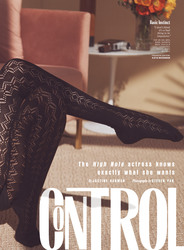
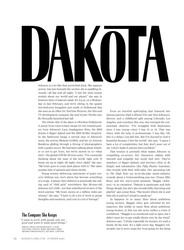
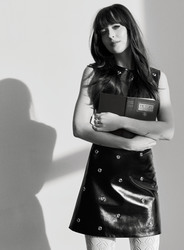


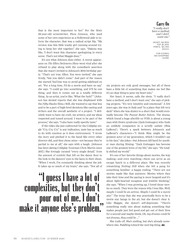
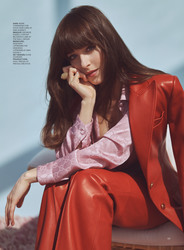


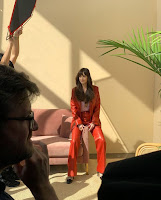

STOP WEARING A WIG FOR GODS SAKE SHOW YOUR REAL HAIR PEOPLE ARE DYING AND ALL YOUR WORRIED ABOUT IS YOURSELF ITS SELFISH.
ReplyDelete